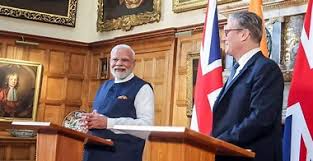India-UK trade deal: How Indian services firms will receive a boost from social security contributions pact with UK

The new trade agreement between India and the United Kingdom strengthens economic ties between the two nations. A major highlight of this deal is the social security contributions pact, which brings direct benefits for Indian services firms and their employees. This agreement reduces costs, improves workforce mobility, and makes Indian companies more competitive in the UK market.
Understanding the Social Security Contributions Pact
Earlier, Indian professionals on temporary UK assignments had to pay National Insurance contributions (NICs), even while contributing to India’s social security. This double payment increased costs for both employees and employers.
The Double Contributions Convention (DCC) resolves this issue. Under the new rules, Indian professionals deputed to the UK for up to 36 months will not pay UK NICs. Instead, they will continue contributing to India’s system. This change saves nearly 20% of salary for professionals and reduces the burden on companies.
A Gamechanger for the Services Sector
The services sector drives over half of India’s GDP and exports. The UK remains a top destination for IT, consultancy, finance, and educational services. With the new pact, Indian firms now enjoy a clear competitive edge.
Key Benefits for Services Firms
- Cost Savings for Employers
IT and consultancy companies will save millions annually by avoiding dual contributions. These savings can fund talent development and innovation. - Higher Employee Take-Home Pay
Professionals will receive higher net pay, making overseas assignments more attractive and financially rewarding. - Improved Competitiveness
Lower costs allow Indian service providers to offer competitive rates compared to global rivals, especially in IT and digital services.
Impact on IT and Technology Companies
The Indian IT sector, led by TCS, Infosys, and Wipro, will benefit the most. The UK remains a key export market for Indian IT services, with thousands of professionals traveling for projects every year.
The exemption may help over 75,000 tech professionals and 900 IT companies. By saving nearly 20% of salary costs per employee, these firms can improve profit margins and expand further.
Opportunities for Other Service Sectors
While IT dominates, other industries will also gain:
- Finance and Accounting: Indian accountants and consultants can work on UK projects with fewer deductions.
- Education: Teachers and trainers on exchange programs will earn more due to lower contributions.
- Architecture and Engineering: Design and consultancy firms can enter the UK market at reduced costs.
- Hospitality and Creative Arts: Chefs, artists, and musicians on short assignments will also save money.
Alignment with Broader Trade Goals
The India-UK trade deal also aims to double bilateral trade to $112 billion by 2030. While goods remain important, services form a crucial pillar of this growth.
The pact addresses India’s long-standing demand to stop double social contributions for its workers. It also makes the UK a more appealing market for Indian talent, especially in technology and financial services.
Challenges and Implementation Timeline
The Double Contributions Convention will take effect after both countries ratify it. Full implementation is expected by mid-2026. Firms must prepare compliance systems to take full advantage of the benefits.
However, the exemption applies only to short-term assignments. Indian nationals hired directly in the UK will still pay NICs since they fall under British social benefit systems.
A Win-Win Arrangement
The pact benefits both nations. India gains through higher disposable incomes, cost savings for companies, and stronger global competitiveness. The UK gains a skilled talent pool without extra social benefit costs.
This agreement proves that trade deals can focus not just on goods but also on workforce mobility. With services becoming more digital, such measures will define future global partnerships.
Conclusion
The India-UK trade deal, with its social security pact, changes how Indian services firms operate abroad. It removes double contributions, improves pay, and cuts costs for employers. As a result, India’s services exports will grow, and economic ties with the UK will deepen.






